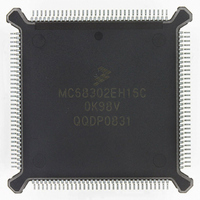MC68302EH16C Freescale Semiconductor, MC68302EH16C Datasheet - Page 221

MC68302EH16C
Manufacturer Part Number
MC68302EH16C
Description
IC MPU MULTI-PROTOCOL 132-PQFP
Manufacturer
Freescale Semiconductor
Datasheets
1.MC68302AG20C.pdf
(4 pages)
2.MC68302AG20C.pdf
(2 pages)
3.MC68302AG20C.pdf
(13 pages)
4.MC68302EH16C.pdf
(481 pages)
Specifications of MC68302EH16C
Processor Type
M683xx 32-Bit
Speed
16MHz
Voltage
5V
Mounting Type
Surface Mount
Package / Case
132-MQFP, 132-PQFP
Controller Family/series
68K
Core Size
32 Bit
Ram Memory Size
1152Byte
Cpu Speed
16MHz
No. Of Timers
3
Embedded Interface Type
SCP, TDM
Digital Ic Case Style
PQFP
Rohs Compliant
Yes
Family Name
M68000
Device Core
ColdFire
Device Core Size
32b
Frequency (max)
16MHz
Instruction Set Architecture
RISC
Supply Voltage 1 (typ)
5V
Operating Temp Range
0C to 70C
Operating Temperature Classification
Commercial
Mounting
Surface Mount
Pin Count
132
Package Type
PQFP
Lead Free Status / RoHS Status
Lead free / RoHS Compliant
Features
-
Lead Free Status / Rohs Status
RoHS Compliant part
Electrostatic Device
Available stocks
Company
Part Number
Manufacturer
Quantity
Price
Company:
Part Number:
MC68302EH16C
Manufacturer:
Freescale Semiconductor
Quantity:
135
Company:
Part Number:
MC68302EH16C
Manufacturer:
PANA
Quantity:
99
Company:
Part Number:
MC68302EH16C
Manufacturer:
Freescale Semiconductor
Quantity:
10 000
Part Number:
MC68302EH16C
Manufacturer:
FREESCALE
Quantity:
20 000
Company:
Part Number:
MC68302EH16CB1
Manufacturer:
Freescale Semiconductor
Quantity:
10 000
Company:
Part Number:
MC68302EH16CR2
Manufacturer:
Freescale Semiconductor
Quantity:
10 000
- MC68302AG20C PDF datasheet
- MC68302AG20C PDF datasheet #2
- MC68302AG20C PDF datasheet #3
- MC68302EH16C PDF datasheet #4
- Current page: 221 of 481
- Download datasheet (2Mb)
By setting its SCC mode register (SCM), any of the SCC channels may be configured to
function as a DDCMP controller. The DDCMP link can be either synchronous (by program-
ming the MODE1–MODE0 bits of the SCC mode register to DDCMP) or asynchronous (by
programming the MODE1–MODE0 bits of the SCC mode register to asynchronous and set-
ting the DDCMP bit in the UART mode register). The DDCMP controller handles the basic
functions of the DDCMP protocol in both cases.
The SCC in DDCMP mode can work in either IDL, GCI, PCM highway, or NMSI interfaces.
When the SCC is used with a modem interface (NMSI), the serial outputs are connected di-
rectly to the external pins. The modem interface uses seven dedicated pins: transmit data
(TXD), receive data (RXD), receive clock (RCLK), transmit clock (TCLK), carrier detect
(CD), clear to send (CTS), and request to send (RTS). Other modem lines can be supported
through the parallel I/O pins.
The DDCMP controller consists of separate transmit and receive sections whose operations
are asynchronous with the M68000 core and may be either synchronous or asynchronous
with respect to the other SCCs. Each clock can be supplied either from the baud rate gen-
erator or externally. More information on the baud rate generator is available in 4.5.2 SCC
Configuration Register (SCON).
The DDCMP controller key features are as follows:
4.5.14.1 DDCMP Channel Frame Transmission Processing
The DDCMP transmitter is designed to work with almost no intervention from the M68000
core (see Figure 4-35).
When the M68000 core enables the DDCMP transmitter and the link is synchronous, it starts
transmitting SYN1–SYN2 pairs (programmed in the data synchronization register) or IDLEs
as determined in the DDCMP mode register. The DDCMP controller polls the first buffer de-
scriptor (BD) in the channel's transmit BD table. When there is a message to transmit, the
DDCMP controller fetches the data from memory and starts transmitting the message (after
first transmitting the SYN1–SYN2 pair when the link is synchronous).
MOTOROLA
• Synchronous or Asynchronous DDCMP Links Supported
• Flexible Data Buffers
• Four Address Comparison Registers with Mask
• Automatic Frame Synchronization
• Automatic Message Synchronization by Searching for SOH, ENQ, or DLE
• CRC16 Generation/Checking
• NRZ/NRZI Data Encoding
• Maintenance of Four 16-Bit Error Counters
MC68302 USER’S MANUAL
Communications Processor (CP)
4-101
Related parts for MC68302EH16C
Image
Part Number
Description
Manufacturer
Datasheet
Request
R
Part Number:
Description:
Manufacturer:
Freescale Semiconductor, Inc
Datasheet:

Part Number:
Description:
MC68302 Configuring the Chip Selects on the MC68302
Manufacturer:
Motorola / Freescale Semiconductor

Part Number:
Description:
MC68302 Design Concept - Expanding Interrupts on the MC68302
Manufacturer:
Motorola / Freescale Semiconductor

Part Number:
Description:
MC68302 MC68302 Adapting a WAN Controller to a LAN Environment
Manufacturer:
Motorola / Freescale Semiconductor

Part Number:
Description:
MC68302 EKB Applications - Power Measurements on the MC68302
Manufacturer:
Motorola / Freescale Semiconductor

Part Number:
Description:
MC68302 Interfacing the MC68020 to a Slave MC68302
Manufacturer:
Motorola / Freescale Semiconductor

Part Number:
Description:
MC68302 MC68302 Software Performance
Manufacturer:
Motorola / Freescale Semiconductor

Part Number:
Description:
MC68302 Evaluating EDX on the ADS302
Manufacturer:
Motorola / Freescale Semiconductor

Part Number:
Description:
MC68302 Design Advisory #1 - MC68SC302 Passive ISDN Protocol Engine
Manufacturer:
Motorola / Freescale Semiconductor

Part Number:
Description:
MC68302, MC68360, and MPC860 Characteristics and Design Notes for Crystal Feedback Oscillators
Manufacturer:
Motorola / Freescale Semiconductor
Part Number:
Description:
Mc68302 Integrated Multi-protocol Processor
Manufacturer:
Freescale Semiconductor, Inc
Datasheet:
Part Number:
Description:
Manufacturer:
Freescale Semiconductor, Inc
Datasheet:
Part Number:
Description:
Manufacturer:
Freescale Semiconductor, Inc
Datasheet:
Part Number:
Description:
Manufacturer:
Freescale Semiconductor, Inc
Datasheet:
Part Number:
Description:
Manufacturer:
Freescale Semiconductor, Inc
Datasheet:











